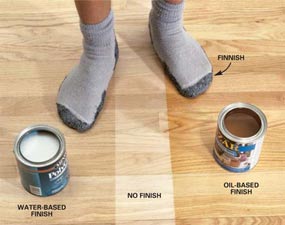Wood Floor Finishes
by Keri Wood Floors
Some Things to Consider When Choosing Your Polyurethane
Both water-based and oil-based polyurethanes offer good protection; the biggest difference is in appearance. If you love the natural look of maple, apply water-based (waterborne) polyurethane. It goes on clear and remains clear. It will slightly accent the character of your wood without giving it the amber tint of oil-based polyurethane. However, some woods, like the oak shown, cry out for that amber tint.
Most water-based polyurethanes contain only 30 to 35 percent solids, compared with the 45 to 50 percent solids in oil-based products. Since these solids create the protective finish, you need to apply four coats, as opposed to two or three. And you may need to apply additional coats every two years or so.
There’s debate over which finish is harder, but most experts maintain that hardness isn’t necessarily a good attribute of a floor finish. You want a finish that will flex along with the floor. And a super-hard finish shows scratches more readily. You’ll prolong the protective life of any finish by eliminating its No. 1 enemies: dirt and grit. Sweep or vacuum the floor often and put throw rugs in high-traffic areas.

After our dustless sanding process is complete it is time to decide what type of finish coat will work best for you. There are basically two types of polyurethanes used in wood floor refinishing – oil-based polyurethane and water-based polyurethane.
Water-based Polyurethane
Water-based polyurethanesprovide a clear finish and have low odor. They can be recoated in two hours so if started early enough in the day, multiple coats can be done in one day. When selecting water-based polyurethane, it is recommended four coats are used in most residential situations.
Oil-based Polyurethane
Oil-based polyurethanes leave an amber glow and require fewer coats. The slower drying deeper penetrating characteristics enhance most stain colors and give you the best protection against spills.

Contact Us Today!
Local areas and places we serve include:
Bloomingdale, Butler, Kinnelon, Montville, Pequannock, Pompton Lakes, Pompton Plains, Riverdale, Wayne and West Milford. Including all of Morris, Passaic, Bergen and Essex County's in New Jersey

After our dustless sanding process is complete it is time to decide what type of finish coat will work best for you. There are basically two types of polyurethanes used in wood floor refinishing – oil-based polyurethane and water-based polyurethane.
Water-based Polyurethane
Water-based polyurethanesprovide a clear finish and have low odor. They can be recoated in two hours so if started early enough in the day, multiple coats can be done in one day. When selecting water-based polyurethane, it is recommended four coats are used in most residential situations.
Oil-based Polyurethane
Oil-based polyurethanes leave an amber glow and require fewer coats. The slower drying deeper penetrating characteristics enhance most stain colors and give you the best protection against spills.
Wood Floor Finishes
by Keri Wood Floors
